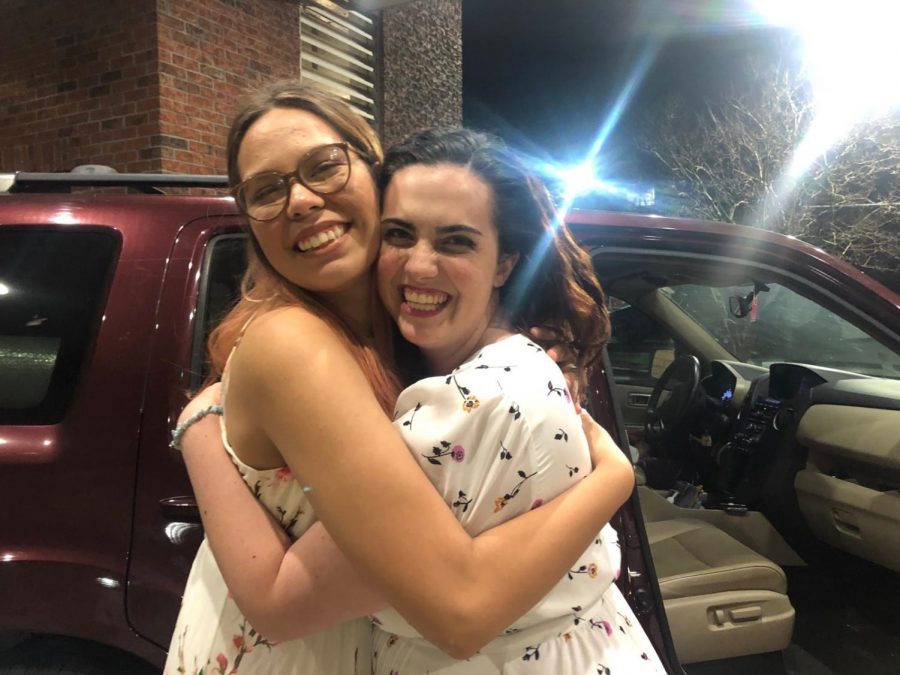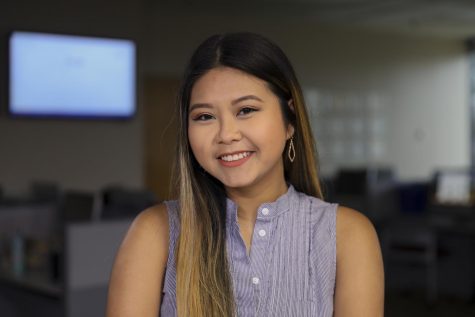Immunocompromised students react to the school year ending
Anna Folatico, musical theater sophomore, hugs her friend Rileigh Levy, history sophomore, as she leaves campus after school was cancelled due coronavirus. Folatico lives with a condition that would leave her vulnerable to the virus. Courtesy of Mackenzie Ross.
April 2, 2020
Loyola University New Orleans made the announcement that classes for the rest of the spring semester would move online on Wednesday, March 11, 2020.
This announcement didn’t come as a big surprise to students, as the number of confirmed cases of coronavirus started to grow in the country and in the city. It did, however, leave a lot of students with mixed feelings– especially those who fit into categories that qualify them to be at higher risk.
“Having senior year cancelled isn’t great, but I do appreciate the steps that administration took to put those at higher risk first,” said Claire Dulle, a senior history major at Loyola.
Most medical professionals emphasize watching out for those who are 65 years of age and older, but the list goes on for those who are considered at risk. Dulle has severe asthma, which is included on the Centers for Disease Control and Prevention’s list of conditions that lead to an increased risk of contracting the coronavirus.
Also included on the list are people with chronic lung disease, serious heart conditions and those who are immunocompromised, including cancer treatment.
Anna Falotico is a sophomore musical theatre major at Loyola. She has a condition called granulomatosis with polyangiitis, or GPA.
“For the treatment I have to do to make sure I stay healthy, it knocks out half of my immune system. Half of my immune system is just gone,” said Falotico. “But I live in the dorms, and it really did just give me a sense of relief. If anybody is sick, everyone will get it,” Falotico said.
Though just a sophomore, Falotico was disappointed that the year was over. As a member of the Epsilon Mu chapter of Gamma Phi Beta Sorority, Inc. on Loyola’s campus, there were a number of events that would be cancelled.
“I’m definitely going to miss it. I’ve been looking forward to having these events all year long,” Falotico said. “But it’s definitely worse for the freshmen who won’t get to experience it for the first time during their first year, and I feel especially bad for the seniors who won’t get to experience it for the last time in their last year. It just sucks,” said Falotico.
Dulle, who has been a part of the Awakening community since her senior year, was a leader for this year’s retreat. She echoes the same sentiment.
“Upon hearing the news, my first thoughts were about [Awakening]. I was definitely heartbroken at first. Dedicating so much time to one thing for months, it’s sad to see that it won’t happen exactly how it should. I became more hopeful as the week went on though, as our team came up with a game plan. Things will be able to happen, just in a different way,” Dulle said.
Seniors continue to feel like there is little closure to their last year of college, but they remain appreciative of administration for communicating with them every step of the way.
“It does suck, but I have had so many conversations about this with my friends. We just can’t thank President Tetlow enough for being transparent about the status of our university while we aren’t there, and the steps the university plans to take. I just hope everyone can make it to commencement when it happens to say bye one last time,” Dulle said.
So far, no announcements have been made regarding the official rescheduled date of commencement.
For more COVID-19 coverage, click here.








